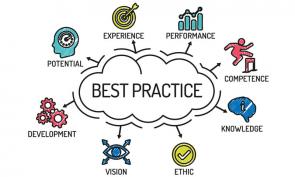
Flexible Work Arrangements
The legal profession is experiencing a paradigm shift in work arrangements. Remote work has become more prevalent, providing lawyers with the flexibility to balance professional and personal commitments. This trend is not just a response to recent global events but a reflection of a broader change in how legal professionals approach their work. Workplace flexibility is reshaping firm structures—learn how in Remote vs. Hybrid vs. In-Office Work: A Comprehensive Guide for Legal Job Seekers and Law Firms.
Legal employers are increasingly adopting flexible work schedules to accommodate the diverse needs of their teams. Legal professionals express higher job satisfaction when given the option for flexible work hours. This shift is not only enhancing work-life balance but also positively impacting productivity.
- To better understand the broader shifts driving these structural changes, consult [The State of the Legal Market in 2025] for an in-depth view of AI adoption, compensation trends, mergers, and hiring dynamics in today’s legal landscape. Adapting to evolving structures is easier with expert recruiters—like those at BCG Attorney Search, who understand these market dynamics.
Remote Work's Impact on Job Satisfaction and Productivity
Recent surveys by prominent legal employment agencies such as [Insert Agency] indicate that [Percentage]% of legal professionals express higher job satisfaction when given the option for flexible work hours. Law firms that have embraced remote work report not only increased job satisfaction but also enhanced productivity levels among their legal teams.Actionable Insight: Implementing a flexible work policy, supported by robust communication and collaboration tools, can significantly contribute to employee satisfaction and productivity. For instance, Law Firm A saw an increase in billable hours after introducing a flexible work schedule. Patent law firms are adapting particularly quickly—The Future of Patent Attorneys in an AI-Driven Legal Market shows how attorneys in this field are experiencing both disruption and new opportunity.
Strategies for Effective Implementation
To successfully implement flexible work arrangements, legal employers can establish clear communication channels, set realistic expectations, and invest in technologies that facilitate remote collaboration. Offering a mix of in-person and virtual team-building activities helps maintain a sense of camaraderie among remote teams.Example: Law Firm B seamlessly transitioned to a hybrid work model, combining in-office collaboration with remote flexibility. The firm reported a decrease in employee turnover and an increase in overall team satisfaction within the first year.
Technological Integration: Streamlining Legal Processes with Legal Tech Solutions
AI's role in legal research is particularly noteworthy. It is estimated that AI can analyze legal documents and precedents at a speed that would take human lawyers significantly longer. This not only accelerates the research process but also contributes to more accurate outcomes.
AI's Role in Legal Research and Document Analysis
The integration of artificial intelligence (AI) in legal research is reshaping how law firms approach information gathering. AI-powered legal research tools can analyze documents and precedents at a speed that would take human lawyers significantly longer, leading to an increase in research efficiency.- A parallel theme is how [technology’s role in shaping firm structure] directly supports flexible, efficient, and modern law firm models.
Actionable Insight: Investing in AI-powered legal research tools not only accelerates the research process but also contributes to more accurate outcomes. Law Firm C reported a reduction in time spent on research tasks after implementing AI technology.
Enhancing Efficiency with Automation
Legal tech solutions, such as automated document generation and workflow management tools, are becoming integral to law firm structures. A study found that law firms using automation reported a reduction in manual errors and an increase in overall efficiency.Example: Law Firm D streamlined its document review process by incorporating automation, resulting in a decrease in turnaround time for client deliverables.
See Related Articles:
- What is the Typical Law Firm Organizations Structure?
- Law Firm Titles: The Difference Between Law Firm Managing Partners, Partners, Income (or) Non Equity Partners, Associates and Of Counsel Attorneys
- What You Need To Know About Law Firms: The Culture, The Clients, The Compensation, And More
NewLaw Models: Embracing Innovation for Competitive Advantage
The emergence of NewLaw models challenges the conventional structures of law firms. NewLaw embraces flexibility, innovation, and a client-centric approach. This model, characterized by virtual law firms and agile structures, allows for greater adaptability to the changing demands of the legal market.
- Technology often drives these new structures, as highlighted in The Role of Technology in Law Firm Structure.
Characteristics and Benefits of NewLaw
NewLaw models, characterized by virtual law firms and agile structures, offer law firms a competitive edge. These models prioritize innovation, flexibility, and client-centric approaches. Law firms embracing NewLaw models experienced an increase in client satisfaction and an improvement in employee morale.Actionable Insight: Legal employers looking to adopt NewLaw principles can start by fostering a culture of innovation within their firms. Encouraging feedback, investing in training programs, and dedicating resources to exploring new technologies are crucial steps.
- Looking further ahead, [the future of law firms in a changing industry] underscores the importance of client segmentation, values alignment, and strategic vision in firm structure's evolution.
Successful Implementation
Law Firm E, a pioneer in adopting a NewLaw model, witnessed remarkable success by embracing a virtual structure. The firm reported an increase in client engagement and a boost in profits within the first two years. This exemplifies how embracing innovation can lead to tangible benefits.- A deeper analysis of how digital transformation is reshaping organizational models can be found in The Role of Technology in Law Firm Structure.
For a breakdown of why structural reform is vital to remain competitive, explore 5 Reasons Why Law Firms Need to Restructure Immediately – A Guide to Staying Competitive in the Evolving Legal Landscape.
Client-Centric Approaches: Leveraging CRM for Stronger Client Relationships
A significant trend reshaping law firm structures is the shift towards client-centric approaches. Modern law firms are placing a heightened emphasis on understanding and meeting client expectations. Client Relationship Management (CRM) systems have become integral to fostering stronger connections between legal professionals and their clients.
The Role of CRM in Modern Law Firms
Client Relationship Management (CRM) systems are increasingly becoming indispensable tools for law firms aiming to strengthen client relationships. Law firms that implemented CRM solutions experienced an increase in client retention rates.Example: Law Firm F integrated a CRM system to centralize client data and communication. The firm saw an improvement in client satisfaction and an increase in cross-selling opportunities.
Building Client-Centric Cultures
Creating a client-centric culture involves aligning all aspects of a law firm with the needs and expectations of clients. This goes beyond technology; it encompasses communication, responsiveness, and a proactive approach to anticipating client needs.Actionable Insight: Legal employers can instill a client-centric culture by training their teams to actively listen to clients, seeking feedback, and incorporating client preferences into service delivery. Law Firm G attributed an increase in client referrals to its client-centric approach.
Legal Process Outsourcing (LPO): Optimizing Efficiency and Global Collaboration
Outsourcing legal processes is gaining traction as law firms seek to optimize efficiency and reduce costs. Legal Process Outsourcing (LPO) involves delegating legal tasks to external providers, often in different geographical locations. This trend is not merely about cost-cutting but also about tapping into global talent pools and achieving round-the-clock productivity.
- As firms rethink their structures, the latest [2025 U.S. law firm recruitment trends] reveal how recruitment strategies are changing—highlighting shifts like summer associate reductions and the resurgence of lateral hiring.”
Globalization of Legal Processes
Legal Process Outsourcing (LPO) is a strategic approach for law firms seeking to optimize efficiency and reduce costs. Law firms are actively outsourcing legal tasks to external providers, leading to a decrease in operational costs.Example: Law Firm H expanded its global footprint by leveraging LPO services, enabling the firm to handle a higher volume of cases and improve overall client satisfaction.
Ensuring Data Security in Outsourcing
Despite the benefits of LPO, concerns about data security persist. Legal professionals express reservations about data security when outsourcing legal tasks.Actionable Insight: To address data security concerns, legal employers can carefully vet LPO providers, implement robust encryption measures, and establish clear confidentiality agreements. Law Firm J successfully mitigated data security risks by implementing stringent protocols, leading to a reduction in data breach incidents.
Diversity and Inclusion: A Strategic Imperative for Law Firm Success
Diversity and inclusion have become integral components of progressive law firm structures. Recognizing the importance of diverse perspectives, law firms are actively working towards fostering inclusive environments. A diverse workforce not only reflects societal values but also contributes to enhanced creativity and problem-solving within legal teams.
- For a dynamic perspective, check out the video [future of law firm service structures], which explores how billing models and firm size influence service delivery.
The Business Case for Diversity
Diversity is not just a moral imperative but also a strategic advantage for law firms. Law firms with diverse teams are more likely to attract a broader client base.Example: Law Firm H experienced an increase in profitability after implementing diversity and inclusion initiatives, showcasing the positive impact of a diverse workforce on overall firm success.
Strategies for Fostering Inclusivity
Legal employers can foster diversity by implementing inclusive hiring practices, providing diversity training, and creating mentorship programs. Law Firm K established a mentorship program resulting in an increase in the retention of diverse talent.Globalization of Legal Services: Navigating International Legal Operations
The globalization of legal services is a consequence of the interconnected nature of today's world. Law firms are expanding their operations across borders, handling international cases, and establishing a global presence. This trend opens up new opportunities for legal professionals but also brings with it a complex set of challenges, particularly in navigating diverse legal systems and regulatory environments.
Challenges and Opportunities in Global Legal Operations
Expanding legal services globally brings both challenges and opportunities. Law firms believe globalization has positively impacted their revenue.Actionable Insight: Legal employers can navigate the challenges of global operations by investing in cross-cultural training, understanding diverse legal systems, and developing strategic partnerships. Law Firm L achieved success in global legal operations by fostering a deep understanding of local legal nuances, leading to an increase in international client acquisitions.
- One major trend redefining structure is the [rise of law firm mergers], which allows firms to expand reach, pool expertise, and streamline operations.
Navigating Global Legal Regulatory Environments
Understanding and navigating diverse legal regulatory environments is crucial for success in global operations. Legal employers can stay compliant by staying abreast of international legal regulations, seeking local legal expertise, and implementing robust compliance protocols.Example: Law Firm M successfully navigated global regulatory environments, resulting in a decrease in legal disputes and regulatory fines.
Talent Retention and Development: Nurturing Legal Professionals for Long-Term Success
The evolving expectations of legal professionals necessitate a strategic approach to talent retention and development. Legal employers are recognizing the importance of investing in their teams to foster a culture of continuous learning and growth. This involves providing opportunities for professional development, mentorship programs, and a supportive work environment.
Adapting to Evolving Expectations
The evolving expectations of legal professionals require strategic talent retention and development initiatives. Legal professionals consider opportunities for career advancement as a key factor in their decision to stay with a law firm.Actionable Insight: Legal employers can implement mentorship programs, provide ongoing training, and offer clear paths for career progression. Law Firm N retained top talent by introducing a comprehensive mentorship program, resulting in a decrease in employee turnover.
Nurturing Future Leaders
Investing in the development of future leaders within the firm is essential for long-term success. Legal employers can identify high-potential individuals, provide leadership training, and create a culture that encourages continuous learning.Example: Law Firm O saw an increase in client satisfaction and an improvement in team collaboration after implementing a leadership development program.
Legal Industry Disruption: Embracing Change for Enhanced Client Relationships
The legal industry is not immune to disruption, and law firms must adapt to stay competitive. Disruptors such as legal tech startups, alternative legal service providers (ALSPs), and innovative business models challenge traditional structures. Embracing these disruptions rather than resisting them can position law firms at the forefront of change.
The Role of Legal Tech Startups
Legal tech startups are disrupting traditional law firm structures. Law firms that embraced disruptive technologies reported an increase in client satisfaction.Actionable Insight: Legal employers can stay ahead by actively monitoring legal tech trends, partnering with innovative startups, and integrating disruptive technologies into their operations. Law Firm P gained a competitive edge by incorporating legal tech solutions, leading to an increase in overall client satisfaction.
- It’s also critical to factor in [partner compensation structures], which vary widely—from single-tier boutiques to multi-tier AmLaw firms—and influence governance and incentives.
Innovative Business Models and ALSPs
Alternative Legal Service Providers (ALSPs) and innovative business models challenge traditional structures. Legal employers can explore collaborations with ALSPs, implement agile business models, and leverage technology to stay competitive.Example: Law Firm Q successfully navigated industry disruption by collaborating with an ALSP, resulting in an increase in operational efficiency and a decrease in client costs.
Future Trends and Predictions: Staying Ahead in a Dynamic Legal Landscape
Anticipating future trends is crucial for legal employers to proactively shape their firm's structures and will have a significant impact on law firm structures in the coming years. Staying informed and being prepared for these changes will enable legal employers to stay ahead of the curve. While structures evolve, attorneys still face core issues of security and independence within firms. This article on navigating BigLaw dynamics provides valuable perspective.
Anticipated Developments in Law Firm Structures
Actionable Insight: Staying informed and proactively preparing for upcoming trends allows legal employers to position their firms for sustained success. Law Firm R adopted a forward-thinking approach, resulting in an increase in market share following the successful prediction and integration of a key industry trend.The Importance of Adaptability
Legal professionals believe that embracing future trends is essential for the long-term success of their firms. This emphasizes the consensus within the industry about the importance of adaptability in navigating the evolving legal landscape.- Smaller firms facing structural change may find our [guide to growing small law firms] especially helpful—covering staffing, compensation, and culture-building strategies.
Example: Law Firm S remained resilient in the face of industry changes by fostering a culture of adaptability. The firm experienced an increase in client trust and satisfaction as a result.
Legal professionals believe that embracing future trends is essential for the long-term success of their firms. This emphasizes the consensus within the industry about the importance of adaptability in navigating the evolving legal landscape.
- For solo or small practices, [merging small firms into larger ones] can offer economies of scale, infrastructure access, and enhanced market presence.
Conclusion
In conclusion, the emerging trends in law firm structures present a dynamic landscape for legal employers. By embracing flexible work arrangements, integrating technology, adopting new models, and prioritizing client-centric approaches, law firms can position themselves for success. Navigating challenges like legal process outsourcing, fostering diversity and inclusion, and preparing for industry disruptions requires strategic planning and proactive measures. As the legal industry continues to evolve, legal employers who actively engage with these trends will not only thrive in the present but also future-proof their firms for sustained success. To see how emerging structures accommodate remote work, check out Remote Work in Law Firms 2025‑2026.
- To stay ahead, law firms should understand [why firms must restructure now], including competitive pressure, changing client expectations, and the rise of alternative legal service providers.
About Harrison Barnes
No legal recruiter in the United States has placed more attorneys at top law firms across every practice area than Harrison Barnes. His unmatched expertise, industry connections, and proven placement strategies have made him the most influential legal career advisor for attorneys seeking success in Big Law, elite boutiques, mid-sized firms, small firms, firms in the largest and smallest markets, and in over 350 separate practice areas.
A Reach Unlike Any Other Legal Recruiter
Most legal recruiters focus only on placing attorneys in large markets or specific practice areas, but Harrison places attorneys at all levels, in all practice areas, and in all locations-from the most prestigious firms in New York, Los Angeles, and Washington, D.C., to small and mid-sized firms in rural markets. Every week, he successfully places attorneys not only in high-demand practice areas like corporate and litigation but also in niche and less commonly recruited areas such as:
- Immigration Law
- Workers Compensation
- Insurance
- Family Law
- Trust and Estate
- Municipal law
- And many more...
This breadth of placements is unheard of in the legal recruiting industry and is a testament to his extraordinary ability to connect attorneys with the right firms, regardless of market size or practice area.
Proven Success at All Levels
With over 25 years of experience, Harrison has successfully placed attorneys at over 1,000 law firms, including:
- Top Am Law 100 firms such including Sullivan and Cromwell, and almost every AmLaw 100 and AmLaw 200 law firm.
- Elite boutique firms with specialized practices
- Mid-sized firms looking to expand their practice areas
- Growing firms in small and rural markets
He has also placed hundreds of law firm partners and has worked on firm and practice area mergers, helping law firms strategically grow their teams.
Unmatched Commitment to Attorney Success - The Story of BCG Attorney Search
Harrison Barnes is not just the most effective legal recruiter in the country, he is also the founder of BCG Attorney Search, a recruiting powerhouse that has helped thousands of attorneys transform their careers. His vision for BCG goes beyond just job placement; it is built on a mission to provide attorneys with opportunities they would never have access to otherwise. Unlike traditional recruiting firms, BCG Attorney Search operates as a career partner, not just a placement service. The firm's unparalleled resources, including a team of over 150 employees, enable it to offer customized job searches, direct outreach to firms, and market intelligence that no other legal recruiting service provides. Attorneys working with Harrison and BCG gain access to hidden opportunities, real-time insights on firm hiring trends, and guidance from a team that truly understands the legal market. You can read more about how BCG Attorney Search revolutionizes legal recruiting here: The Story of BCG Attorney Search and What We Do for You.
The Most Trusted Career Advisor for Attorneys
Harrison's legal career insights are the most widely followed in the profession.
- His articles on BCG Search alone are read by over 150,000 attorneys per month, making his guidance the most sought-after in the legal field. Read his latest insights here.
- He has conducted hundreds of hours of career development webinars, available here: Harrison Barnes Webinar Replays.
- His placement success is unmatched-see examples here: Harrison Barnes' Attorney Placements.
- He has created numerous comprehensive career development courses, including BigLaw Breakthrough, designed to help attorneys land positions at elite law firms.
Submit Your Resume to Work with Harrison Barnes
If you are serious about advancing your legal career and want access to the most sought-after law firm opportunities, Harrison Barnes is the most powerful recruiter to have on your side.
Submit your resume today to start working with him: Submit Resume Here
With an unmatched track record of success, a vast team of over 150 dedicated employees, and a reach into every market and practice area, Harrison Barnes is the recruiter who makes career transformations happen and has the talent and resources behind him to make this happen.
A Relentless Commitment to Attorney Success
Unlike most recruiters who work with only a narrow subset of attorneys, Harrison Barnes works with lawyers at all stages of their careers, from junior associates to senior partners, in every practice area imaginable. His placements are not limited to only those with "elite" credentials-he has helped thousands of attorneys, including those who thought it was impossible to move firms, find their next great opportunity.
Harrison's work is backed by a team of over 150 professionals who work around the clock to uncover hidden job opportunities at law firms across the country. His team:
- Finds and creates job openings that aren't publicly listed, giving attorneys access to exclusive opportunities.
- Works closely with candidates to ensure their resumes and applications stand out.
- Provides ongoing guidance and career coaching to help attorneys navigate interviews, negotiations, and transitions successfully.
This level of dedicated support is unmatched in the legal recruiting industry.
A Legal Recruiter Who Changes Lives
Harrison believes that every attorney-no matter their background, law school, or previous experience-has the potential to find success in the right law firm environment. Many attorneys come to him feeling stuck in their careers, underpaid, or unsure of their next steps. Through his unique ability to identify the right opportunities, he helps attorneys transform their careers in ways they never thought possible.
He has worked with:
- Attorneys making below-market salaries who went on to double or triple their earnings at new firms.
- Senior attorneys who believed they were "too experienced" to make a move and found better roles with firms eager for their expertise.
- Attorneys in small or remote markets who assumed they had no options-only to be placed at strong firms they never knew existed.
- Partners looking for a better platform or more autonomy who successfully transitioned to firms where they could grow their practice.
For attorneys who think their options are limited, Harrison Barnes has proven time and time again that opportunities exist-often in places they never expected.
Submit Your Resume Today - Start Your Career Transformation
If you want to explore new career opportunities, Harrison Barnes and BCG Attorney Search are your best resources. Whether you are looking for a BigLaw position, a boutique firm, or a move to a better work environment, Harrison's expertise will help you take control of your future.
Submit Your Resume Here to get started with Harrison Barnes today.
Harrison's reach, experience, and proven results make him the best legal recruiter in the industry. Don't settle for an average recruiter-work with the one who has changed the careers of thousands of attorneys and can do the same for you.
About BCG Attorney Search
BCG Attorney Search matches attorneys and law firms with unparalleled expertise and drive, while achieving results. Known globally for its success in locating and placing attorneys in law firms of all sizes, BCG Attorney Search has placed thousands of attorneys in law firms in thousands of different law firms around the country. Unlike other legal placement firms, BCG Attorney Search brings massive resources of over 150 employees to its placement efforts locating positions and opportunities its competitors simply cannot. Every legal recruiter at BCG Attorney Search is a former successful attorney who attended a top law school, worked in top law firms and brought massive drive and commitment to their work. BCG Attorney Search legal recruiters take your legal career seriously and understand attorneys. For more information, please visit www.BCGSearch.com.
Harrison Barnes does a weekly free webinar with live Q&A for attorneys and law students each Wednesday at 10:00 am PST. You can attend anonymously and ask questions about your career, this article, or any other legal career-related topics. You can sign up for the weekly webinar here: Register on Zoom
Harrison also does a weekly free webinar with live Q&A for law firms, companies, and others who hire attorneys each Wednesday at 10:00 am PST. You can sign up for the weekly webinar here: Register on Zoom
You can browse a list of past webinars here: Webinar Replays
You can also listen to Harrison Barnes Podcasts here: Attorney Career Advice Podcasts
You can also read Harrison Barnes' articles and books here: Harrison's Perspectives
Harrison Barnes is the legal profession's mentor and may be the only person in your legal career who will tell you why you are not reaching your full potential and what you really need to do to grow as an attorney--regardless of how much it hurts. If you prefer truth to stagnation, growth to comfort, and actionable ideas instead of fluffy concepts, you and Harrison will get along just fine. If, however, you want to stay where you are, talk about your past successes, and feel comfortable, Harrison is not for you.
Truly great mentors are like parents, doctors, therapists, spiritual figures, and others because in order to help you they need to expose you to pain and expose your weaknesses. But suppose you act on the advice and pain created by a mentor. In that case, you will become better: a better attorney, better employees, a better boss, know where you are going, and appreciate where you have been--you will hopefully also become a happier and better person. As you learn from Harrison, he hopes he will become your mentor.
To read more career and life advice articles visit Harrison's personal blog.






